Fenn College On-Line
Fenn College School of Engineering

Dr. Burl H. Bush, Dean of Engineering
The School of Engineering prepares its students for the technical and social responsibilities of a career in engineering and science. It seeks to instill in its students a desire for continued intellectual and professional growth. To achieve these ends, the School provides a thorough undergraduate education in mathematics and the physical sciences, and in the science and technology of one of the major fields of engineering or engineering science. Courses in the humanities and social sciences enrich each school program. The School coorelates academic studies with professional practice through the cooperative plan.
The School of Engineering offers programs leading to:
- Bachelor of Chemical Engineering
- Bachelor of Civil Engineering
- Bachelor of Electrical Engineering
- Bachelor of Mechanical Engineering
- Bachelor in Engineering Science
- Major in Chemistry
- Major in Mathematics
- Major in Metallurgy
- Major in Physics
Each degree fulfills the educational requirements for professional engineering registration in many states, including Ohio.
Degree Requirements
The degrees listed above are conferred when a student satisfactorily completes the following requirements:
Volume of work - The number of credits varies slightly for the different degrees. In no event, however, will a degree be conferred for less than 210 credit hours of academic work.
Quality of Work - The student must have accumulated a total of quality points that equals no less than 2.0 times the number of credit hours taken.
Major Field - A major consists of at least 36 credit hours earned in one department. a "composite major" includes 60 credit hours with at least 20 hours earned in each of two departments. Students may also select one or two minor fields. Choice of a major field may be made at the beginning of the sophmore year and not later than the beginning of the pre-junior year.
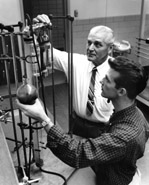
Professor Elmore Pettyjohn Chem. Engineering research lab.
CHEMICAL ENGINEERING - that branch of engineering concerned with the development and application of manufacturing processes in which chemical or certain physical changes of materials are involved. Out of this work has come the plastics, high octane fuels, drugs and antibiotics, synthetic rubber, paints, detergents, and nuclear energy development. Chemical engineering is an integral part of the nation's largest industry, an industry which has doubled in size in the last decade.
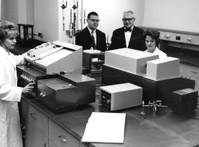
Dr. Frank Bockhoff and Dean Burl Bush Instrumental Analysis laboratory.
CHEMISTRY - The increased emphsis upon research in the physical sciences is reflected in this curriculum, which is designed for the student oriented toward a career in chemical research or development. The program provides a strong foundation in the fundamentals of chemistry, physics, and mathematics, and enables the graduate to become a dependable and contributing member of a research team or to continue his education in graduate school.
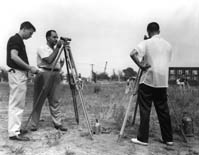
Professor Frank Gallo Surveying class.
CIVIL ENGINEERING - The field of civil engineering is large and includes such subdivisions as structural, highway, sanitary, water supply, and hydraulic engineering and surveying. A civil engineer's work may require concentration in one of these subdivisions. In the midwest there is a great need for civil engineers having a strong training in structural engineering, but with some exploratory overlap into other subdivisions. The civil engineering program at Fenn is particularly well adapted to meet this need.
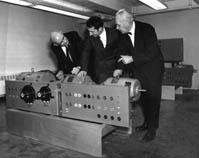
Prof. Kenneth Sherman, Prof. William Kerka & William Mitchell in Electric Motor lab, Stilwell Hall.
ELECTRICAL ENGINEERING - One of the most challenging and diversified of the professions, electrical engineering has developed rapidly into an extremely important field. Recent developments and new tools in the hands of the electrical engineer have enabled him to accomplish feats which a short time ago would have seemed fatastic. The possibility of electronics apart from communication has only recently become apparent. The breadth of the profession and its intimate relationship to the basic sciences and allied engineering fields have set the pattern for Fenn's curriculum.
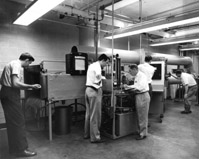
Prof. Charles Wilson Heat and Power laboratory.
MECHANICAL ENGINEERING - is the broadest in application of all branches of engineering and provides unlimited opportunities in a wide variety of industries. The functions of a mechanical engineer fall into three general categories: design, research and development, and management; and into two broad areas: machines and systems for energy conversion, and manufacturing procedures and industrial organization. The curriculum provides thorough grounding in the basic sciences and engineering sciences plus a limited amount of specialization in the two areas through options designed as energy conversion and industrial engineering. A strong background in machine design and materials is common to both options and emphasis is placed on analyzing and solving technical problems, the systems approach, and the requirements of economy in material and human resources.

Prof. Virgil Hales Engineering Graphics class.
ENGINEERING SCIENCE - Modern scientific developments have led to increasingly complex problems that cross the boundary lines separating the various branches of engineering. The solutions of these problems require engineers and scientists with ability and training in basic analysis an broad preparation in engineering science. The curriculum is designed to emphasize the general laws and behavioral aspects of engineering systems without regard to departmental characteristics. Students electing the engineering science program should have more than average ability in mathematics and physics; and should be interested in a career in research and development.



